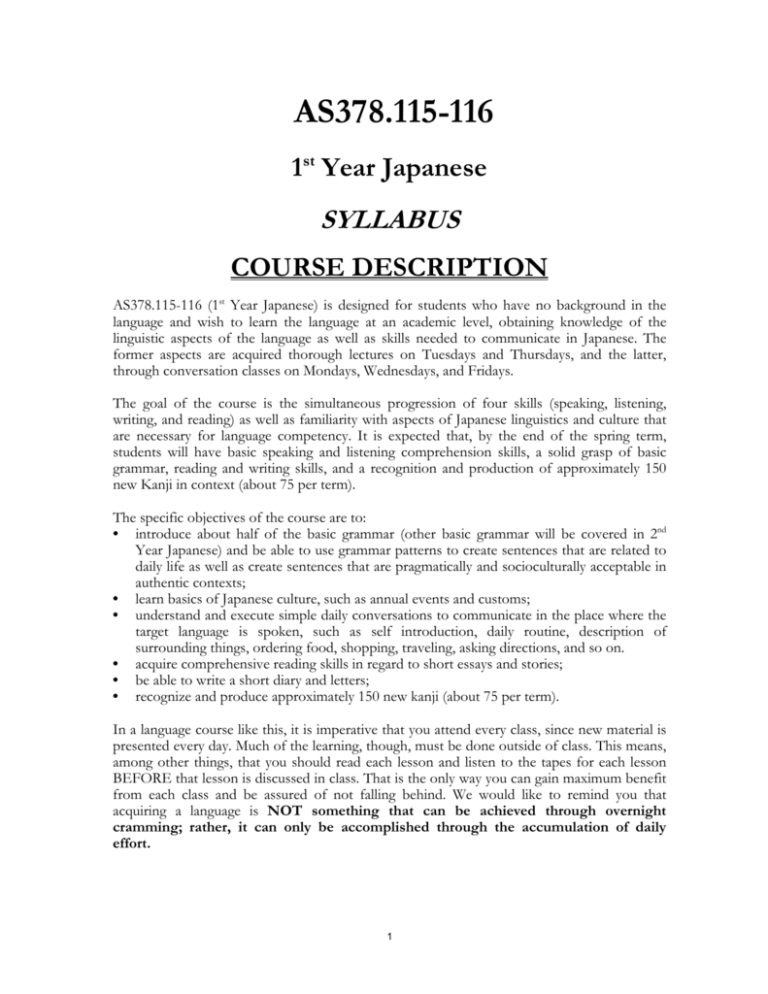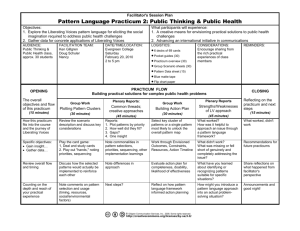Spring 2016 Syllabus
advertisement

AS378.115-116 1st Year Japanese SYLLABUS COURSE DESCRIPTION AS378.115-116 (1st Year Japanese) is designed for students who have no background in the language and wish to learn the language at an academic level, obtaining knowledge of the linguistic aspects of the language as well as skills needed to communicate in Japanese. The former aspects are acquired thorough lectures on Tuesdays and Thursdays, and the latter, through conversation classes on Mondays, Wednesdays, and Fridays. The goal of the course is the simultaneous progression of four skills (speaking, listening, writing, and reading) as well as familiarity with aspects of Japanese linguistics and culture that are necessary for language competency. It is expected that, by the end of the spring term, students will have basic speaking and listening comprehension skills, a solid grasp of basic grammar, reading and writing skills, and a recognition and production of approximately 150 new Kanji in context (about 75 per term). The specific objectives of the course are to: • introduce about half of the basic grammar (other basic grammar will be covered in 2nd Year Japanese) and be able to use grammar patterns to create sentences that are related to daily life as well as create sentences that are pragmatically and socioculturally acceptable in authentic contexts; • learn basics of Japanese culture, such as annual events and customs; • understand and execute simple daily conversations to communicate in the place where the target language is spoken, such as self introduction, daily routine, description of surrounding things, ordering food, shopping, traveling, asking directions, and so on. • acquire comprehensive reading skills in regard to short essays and stories; • be able to write a short diary and letters; • recognize and produce approximately 150 new kanji (about 75 per term). In a language course like this, it is imperative that you attend every class, since new material is presented every day. Much of the learning, though, must be done outside of class. This means, among other things, that you should read each lesson and listen to the tapes for each lesson BEFORE that lesson is discussed in class. That is the only way you can gain maximum benefit from each class and be assured of not falling behind. We would like to remind you that acquiring a language is NOT something that can be achieved through overnight cramming; rather, it can only be accomplished through the accumulation of daily effort. 1 INFORMATION AS378.115 Fall 2015 INSTRUCTORS Yuki Johnson Director, CLE yuki.johnson@jhu.edu Satoko Katagiri Lecturer, CLE 由紀ジョンソン Krieger Hall 5th Floor Rm 524 TEL: 410-516-4396/FAX: 410-516-8008 片桐聡子 Krieger Hall 5th Floor Rm 521 OFFICE HOURS Yuki Johnson: Satoko Katagiri Th 1:30-2:30, and by appt. WF 1:30-2:30 CLASS HOURS AND ROOMS T Th (Lecture): 12:00 – 1:15 Krieger 308 Johnson 10:00 – 11:00 11:00 – 12:00 12:00 – 1:00 Bloomberg 178 Bloomberg 178 Bloomberg 178 Katagiri Katagiri Katagiri MWF (Conversation): TEXTBOOKS • Genki I (2nd Edition) Genki I (2nd Edition) Genki I (2nd Edition) • Main textbook Workbook Audio CD Fundamentals of Japanese Grammar: Comprehensive Acquisition Hawaii UP Purchase available at Barns and Nobles and Amazon.com Useful Websites: • げんき Self study http://genki.japantimes.co.jp/self/self.html • Hiragana stroke order practice http://www2.g-tak.gsn.ed.jp/project2/hiragana2/index.htm • なかま Hiragana stroke order practice (another language textbook) http://tell.fll.purdue.edu/hatasa/NewNakama/FriendsOfNewNakama.html • なかま Katakana stroke order practice http://tell.fll.purdue.edu/hatasa/NewNakama/FriendsOfNewNakama.html GRADING CRITERIA 2 Exams: A total of two written/oral exams is given during each term. Two sets of exams are given in the fall term as shown in the schedule. (A new schedule will be provided at the beginning of the spring term.) The written exams do not go beyond the specified class time, although the oral exam may exceed time depending on the given tasks. The two written and two oral exams in each term are achievement tests including/covering materials introduced in class up to the day the exam is given. Detailed information will be announced in class. The highest possible score for each of the two written exams is 40, and for each of the two oral exams, 20 (for each term). Quizzes: Quizzes will be given during the first 10 minutes of lecture class on Tuesdays and Thursdays and constitute 30% of the total grade. If you need to come more than 10 minutes late to every class, then you should withdraw from class, as you will not be able to take the quizzes. Quizzes start promptly on the hour and are collected at 10 minutes after the hour, which means that you need to finish taking the quiz within 10 minutes, and there will be no extension. The highest possible score for each quiz is 30 points, and the average of all quizzes is counted toward your final score. Assignments: There are three kinds of assignments: 1. Assignments found in the workbook that you will have purchased. Write the answers directly in the workbook, tear out the pages, staple them together, and submit them to the instructor on the assigned day. 2. Assignments sent to you as a file via e-mail. This is basically a copy of the exercise found in the main textbook on the part “Reading and Writing.” For these assignments, you first need print out the file, write the answers on the hardcopy sheets, and submit them to the instructor on the scheduled day. Extra sheets are sometimes required for longer writing exercises. 3. Assignments sent to you as a file via e-mail. These include kanji practice sheets where you repeat writing the kanji and create a couple of sentences using the kanji. Additional assignments may be given via e-mail without a previous notice. Print out all materials, write answers on the sheets, and submit them to your instructor on the day scheduled on the assignment. To help you to study/learn the materials effectively, Katagiri sensei may also give you a very short assignment during practicum class. The instruction is given orally or via e-mail. As long as you come to class regularly, you should not encounter any confusion or problems. Pay attention to class instructions every day. 3 Late submissions are NOT accepted. The highest possible score for each assignment is 10 points, and the average of all assignments is counted toward your final score. 2 exams (average): 40% 2 oral exams (average): 20% Quizzes (average): 30% Assignments (average): 10% 98 ‐ 100 = A+ 87‐89= B+ 77‐79= C+ 94 ‐ 97 = A 83‐86= B 73‐76= C 90 ‐ 93 = A- 80‐82= B‐ 70‐72= C- 67 ‐ 69 64 ‐ 66 60 ‐ 63 D+ D D POLICY (strictly observed) 1. Our Center strictly observes the procedures regarding violations of academic integrity published on the JHU website. The following is an excerpt from the JHU website: http://www.graduateboard.jhu.edu/integrity.htm Academic Integrity: In all aspects of their work, students assume an obligation to conduct themselves in a manner appropriate to the Johns Hopkins University’s mission as an institution of higher education. A student must refrain from acts that he or she knows, or under the circumstances has reason to know, may impair the academic integrity of the University. Violations of academic integrity include, but are not limited to: cheating, plagiarism; submitting as one’s own the same or substantially similar work of another; knowingly furnishing false information to any agent of the University for inclusion in the academic records; dishonesty in discharging teaching assistant duties; falsification; forgery. Student Conduct: The University expects all students to respect the rights of others, and to refrain from behavior that impairs the University’s mission of teaching, research/scholarship, and outreach to the local, national, and international community. Violations of appropriate student conduct may include, but are not limited to: harassment behavior (physical or verbal); intimidation or verbal abuse; actions that are a danger to one’s own personal safety or that may harm others, and actions that destroy, impair, or wrongfully appropriate property. Students are expected to know and abide by University policies governing student conduct and academic integrity. Those who impair the University’s mission are subject to expulsion. Refer to your divisional academic policies and procedures for specific information. 2. This course is not designed for students who identify Japanese as their first language. The Center for Language Education reserves the right to place students in the language course appropriate to their level of language skill. 3. No incomplete grade is given. 4. If another course is overlapping with AS378.115-116, you must choose one course over the other. Simultaneous registration is strictly prohibited. 5. Make up quizzes and exams will not be given. If there are extenuating circumstances, you need to contact the instructor PRIOR to class and arrange a day and time to make up the quiz/exam. Requests to the instructor after class will not receive any consideration. (Contact the instructor directly via e-mail, phone, etc., regarding a possible delay of your arrival. Do not leave a message with the administrator in the Center for Language Education.) 4 6. Anyone leaving class immediately after taking a quiz will receive a score of zero on that quiz unless s/he has presented a justifiable reason PRIOR to that class. Lecture classes on Tuesdays and Thursdays start exactly at the hour with a quiz. If you are late by more than ten minutes, you cannot take the quiz for that day, unless a legitimate reason is presented PRIOR to class. 7. Written assignments must be submitted upon your arrival to the classroom. Late submission after 3:00 p.m. of the due date is not accepted regardless of reasons. 8. Attendance is one of the MOST IMPORTANT aspects of the course and not only contributes to your knowledge of the language but also is essential to your development of SKILLS. In order for you to form good attendance habits, we employ the following policy: Any student missing more than 2 days (unexcused absences) will receive a 0.5-point reduction from their final score for each unexcused absence (beyond 2). For example, if you miss 5 days in a term, although the first two are exempted, 0.5 point is lost for each of the third day, fourth day, and fifth day, giving a total of 1.5 points subtracted from the final score you receive in the course. In addition, if you miss part of class time, you are considered as tardy. Two tardies will be counted as 1 absence. If your absence is due to unavoidable circumstances, let your instructor know immediately before class starts and wait for his/her instructions. 9. In order to move on to the next term, you are required to receive at least a grade of C+. If you receive a grade of C or below and wish to continue to the next term/level, you need to study during the break and take a placement test a day before the new term starts. If you receive a grade higher than C+, then you can take the subsequent course. 10. The Center for Language Education does not allow any student to sit in class without registration. 11. The Center for Language Education follows Hopkins regulations and policies regarding religious holidays detailed in the student handbook. Religious holidays are valid reasons to be excused from class. Students who must miss a class or examination because of a religious holiday must inform the instructor as early in the semester as possible in order to be excused from class and to make arrangements to make up any work that is missed. Students who expect to miss several classes because of religious holidays are encouraged to meet with their academic advisers to consider alternative courses prior to registration. http://education.jhu.edu/catalog/admission_registration_finance/registration/religiousho lidays.html 12. Any student with a disability who may need accommodations in this class must obtain an accommodation letter from Student Disability Services, 385 Garland, (410) 516-4720, studentdisabilityservices@jhu.edu REQUEST AND RECOMMENDATION 1. We request that during the class period, no food is consumed. 2. We request that you contact us at your earliest convenience if you feel that you are falling behind or that you cannot avoid missing classes. Since we meet frequently, we need to keep you informed of various events and issues. 5 3. We recommend that students with 18 credits besides the language not to take the language course. Language courses require regular practice every day. Therefore, it cannot be a light extra course, and you need a strong commitment to a language course. 4. We recommend that you take a language course based on a letter grade and NOT a pass/fail grade. In particular, a C+ or better is required to move to higher levels, which may not be evident in a pass/fail grade (e.g., in cases where a “pass” equates to a C, making it difficult to assess readiness for progression). JHU WEBSITES FOR IMPORTANT INFORMATION • Center for Language Education: http://www.cledu.jhu.edu/ Academic Calendar: http://www.jhu.edu/~registr/calendar.html • Add/Drop Deadlines: http://www.jhu.edu/~registr/ImportantNotices/Undergrad/adddrop%20deadlinesFall%202011%20UG.pdf • Important Dates to Remember: http://www.advising.jhu.edu/dates.php • Final Exam Schedule: http://www.jhu.edu/~registr/exam.html ACADEMIC CALENDAR (Spring 2016) http://web.jhu.edu/registrar/forms-pdfs/201516%20FINAL%20Academic%20Calendar.pdf 6 Weekly Schedule Week 1 Week 2 Week 3 Week 4 Week 5 Week 6 Week 7 Date 月 1/25 火 1/26 水 木 金 月 火 水 木 金 月 火 1/27 1/28 1/29 2/1 2/2 2/3 2/4 2/5 2/8 2/9 Lesson Intro to AS378.116 (Review) Lecture: L7 Grammar & Clture (G&C) Practicum: L7 Lecture: L7 G&C Practicum: L7 Practicum: L7 Lecture: L7 G&C Practicum: L7 Lecture: L7 G&C Practicum: L7 Practicum: L7 Lecture: L8 G&C 水 木 金 月 火 水 木 金 月 火 水 木 金 月 火 水 木 金 月 火 水 木 金 2/10 2/11 2/12 2/15 2/16 2/17 2/18 2/19 2/22 2/23 2/24 2/25 2/26 2/29 3/1 3/2 3/3 3/4 3/7 3/8 3/9 3/10 3/11 Practicum: L8 Lecture: L8 G&C Practicum: L8 Practicum: L8 Lecture: L8 G&C Practicum: L8 Lecture: L8 G&C Practicum: L8 Practicum: L8 Lecture: L9 G&C Practicum: L9 Lecture: L9 G&C Practicum: L9 Practicum: L9 Lecture: L9 G&C Practicum: L9 Lecture: L9 G&C Practicum: L9 Practicum: L9 Grammar Review Oral Review Written Exam I Oral Exam I Quiz/Exam L7 New Vocab & Q HW Due WinterHW* L7 Grammar L7 Grammar L7 Grammar & Kanji L7 L7 L8 New Vocab & Grammar L8 Grammar L8 Grammar L8 Grammar & Kanji L8 L9 New Vocab & Grmr L8 L9 Grammar L9 Grammar L9 Grammar L9 Grammar & Kanji L9 L9 7 Week 8 Week 9 Week10 Week11 Week12 Week13 Week14 月 火 水 木 金 月 火 水 木 金 月 火 水 木 金 月 火 水 木 金 月 火 水 木 金 月 火 水 木 金 月 火 水 木 金 3/14 3/15 3/16 Spring Vacation 3/17 3/18 3/21 Presentation on Spring Vacation (feedback will be given) 3/22 Lecture: L10 Grammar & Culture 3/23 Practicum: L10 3/24 Lecture: L10 Grammar & Culture 3/25 Practicum: L10 3/28 Practicum: L10 3/29 Lecture: L10 Grammar & Culture 3/30 Practicum: L10 3/31 Lecture: L10 Grammar & Culture 4/1 Practicum: L10 4/4 Practicum: L10 4/5 Lecture: L11 Grammar & Culture 4/6 Practicum: L11 4/7 Lecture: L11 Grammar & Culture 4/8 Practicum: L11 4/11 Practicum: L11 4/12 Lecture: L11 Grammar & Culture 4/13 Practicum: L11 4/14 Lecture: L12 Grammar & Culture 4/15 Practicum: L12 4/18 Practicum: L12 4/19 Lecture: L12 Grammar & Culture 4/20 Practicum: L12 4/21 Lecture: L12 Grammar & Culture 4/22 Practicum: L12 4/25 Practicum: L12 4/26 Lecture: L12 Grammar & Culture 4/27 Oral Review 4/28 Written Exam II 4/29 Oral Exam II 8 Culture HW L10 New Vocab & Grmr L10 Grammar L10 Grammar L10 Grammar & Kanji L10 L10 L11 New Vocab & Grmr L11 Grammar L11 Grammar & Kanji L11 L11 L12 New Vocab & Grmr L12 Grammar L12 Grammar L2 Grammar & Kanji L12 C-HW L12








